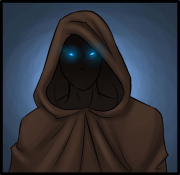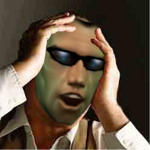|
Lightning Lord posted:It's also a problem because some people view criticism of systems as criticism of the players. Oh god this. I don't know what the hell it is, but when I see someone trash-talking a system I like, I always have this bizarre need to leap in and start defending the system like I had a personal stake. Like with Jedit on the last page. I had to actually stop myself from getting involved into what would have amounted to an argument over tastes with him/her because it wouldn't have accomplished anything, but still a thing I like was insulted.
|
|
|
|

|
| # ? May 25, 2024 13:03 |
|
TTRPGs are an incredibly creative exercise that tend to have a large investment of time and effort, either in making and running a campaign for people to play in or making a character and its history. It's not really a surprise that people tend to be defensive about hobbies like that. Still, almost every problem with RPG fandoms and the industry itself are still pretty much geek social fallacies writ large. I've run into a lot of people in the past who got actively offended by the very idea that attention to game balance and system math is important just because it inherently implied that there's somewhat objective ways to tell whether game mechanics are well-designed or not, and by extension, that they could be bad at them.
|
|
|
|
LatwPIAT posted:Whereas in every other industry, including the more cogent part of the board game industry, testing is destructive. Yet because RPG players, as a group, are collectively traumatized by bad games, I agree completely with your reasoning, but I'd like to add that there is a secondary factor. If I may hare off on a tangent for a minute, I promise I'll get back to the main point. I figured out after about four years of part-time community college attendance that I wanted to be a technical writer, and by sheer coincidence, was living in the same city with the only university in my state that had a full technical writing degree program. So I transferred all my units and started going to grown-up school* and my first degree program class was Technical and Professional Writing 400, "Intro to Technical and Professional Writing." In order to qualify for this class, you had to have a minimum score of "pretty decent" on the JEPET, the Junior English Proficiency Essay Test. You also, much more importantly, had to have an interest in some kind of technical or professional writing... but in addition to the people taking the class for a TPW degree, certificate, or minor, there were also a bunch of people taking it as an elective for a general English degree. This included quite a few folks majoring in Creative Writing. Pretty much every creative writing student either dropped the class, or received a failing grade. This was almost entirely down to one factor: our professor, who was the department head at the time, treated our writing projects the way a boss would treat an employee's writing projects. She was not deliberately mean, but she didn't coddle anyone. If your work didn't meet the standards that she set for the class, she said so, and pointed out in detail precisely why. This wasn't just copyediting, which she did of course; she criticised poor structure, incorrect or inappropriate style or tone, lack of clarity, problems with navigation or signposting, and so on. A lot of people incorrectly think technical writing isn't a creative endeavor. It absolutely is: to translate raw information about a technical subject into something that is accurate, complete, easy to read, understandable, and well-organized requires creativity. You are often presented with challenges that you have to be creative to overcome. But creative writing students were, for the most part, not prepared for serious criticism of their work. Too many people got angry or upset when the professor - or even just a peer (we did one-on-one peer reviews before handing any assignments in) pointed out that this bit would be better as a table instead of a list, or that bit needed to be pared down, or this statement was ambiguous and needed to be clarified. I get the distinct impression that the large majority - maybe the totality - of roleplaying games are written by creative writers who have little or no experience with writing in a professional context... at least, in any professional context outside the RPG industry. When you write your novel, your name is on the cover and everything in it belongs to you. OK, maybe your publisher insists on some edits, but it's still a creative work that you get to put your personal mark on, and your style, plot elements, characters, etc. are all yours. But when your writing belongs wholly to your employer - when what you publish directly represents them, in a business context - when your name isn't necessarily even on the cover? There is no room for ego. None. It does not matter one whit if you put your heart and soul into the "Managing User Accounts" section of the Administrator's Guide for an enterprise software product: customers are paying a hundred thousand dollars for this product suite, and they expect to be able to easily manage those user accounts, and so that chapter has to loving pass QA. If a tester couldn't successfully upload the CSV file to import user accounts because Step 4 was confusing to them, then your boss is going to expect you to rewrite that step until it's perfectly clear... and your boss is not going to accept some kind of infantile temper tantrum from you about having to modify your masterpiece of writing just because some stupid QA engineer just "didn't get your vision" or "complains too much" or "is stupid." In fact you shouldn't even feel upset. It's understandable if you get a little flushed when you're an intern and your very first project solicits negative feedback. But by the time you're being actually paid for written technical writing work in a professional context? You should be completely accustomed to having to revise everything you write, sometimes a lot of times. You should not feel as though your qualifications are being attacked when people disagree with an approach you've taken or request a change to something. Sometimes you're right and they're wrong, and if you've proven that you're a professional and your expertise is real, you can push back; but you pick those battles carefully and when you get feedback you take it seriously, because the majority of the time, you do in fact need to fix something. When I hear that someone writing an RPG product isn't actually interested in what latwPIAT called "destructive testing," I find that extremely telling. It's not just laziness or a disinterest in what the customers want. It's a sign that the writer in question is simply not professional. Is not cut out for this poo poo at all. The TPW 400 class wasn't that difficult, but it was designed to keep students from wasting their time trying to get into a profession that they were not temperamentally cut out for. The professor didn't pull her punches much, because she knew it's critical that you be able to deal with that stuff, and it's better to find out right away, up-front, weather you can or can't. Technical writers who can't deal with it don't last long. I've been doing this for 16 years now, but it only took me a few months to get to the point where I was over my junior-writer stomach butterflies and to the point where, if someone pointed out an error in my copy, I wasn't embarrassed... I was happy, because that meant the error was caught and I could fix it, before publication. My biggest problem isn't people criticising my work, it's getting people who have promised to do a review to actually do a real review instead of a cursory skim or, worse, just never getting around to it. I hate it when we hit a deadline and have to push out something I've done, and I haven't been able to get one of the key subject matter experts to do a good technical review pass. Makes me nervous as hell, because there's just no such thing as a technical writer who gets it 100% right on their own, every time. But, apparently, TTRPG writers who simply aren't temperamentally suited to direct criticism of their work - even on the level of dispassionate, technical review - aren't just common, they're the norm. Even among some of the biggest names in the industry. When I hear that the D&D team were not only not interested in hearing that something in their playtest didn't work right, but that they went out of their way to delete comments pointing out that kind of problem, it's boggling. I mean, gently caress, good competent review usually costs a pile of money. Here the D&D guys are in the extremely enviable position of having a legion of highly experienced experts who are climbing over one another to QA your work for free, and you're actively censoring their feedback? I think it goes beyond just a cycle of players traumatized by poor writing not realizing that poor writing isn't actually inevitable. They're not even aware that they're documenting a technical system, and there are bugs in both the system and in their documentation of it, and that they can only benefit by having those bugs identified and reported. Instead, they're Artists, and few artists love a critic. * I mostly attended night classes while working my way through college, and I actually found that the large majority of people taking night classes at community college were deadly-serious adults focused on getting a career going, improving themselves, etc.; whereas a very large proportion of students at the university were completely half-assing their way through the process, flailing around spending their parents money, unfocused, unclear on their life goals, and often outright hating being there. Leperflesh fucked around with this message at 07:46 on Feb 22, 2016 |
|
|
|
Kurieg posted:"We don't need to balance the classes because people who want balanced classes will play with DMs that balance the classes for them." is by far the most irritating piece of moon logic to come out of 5e. It's not a new idea that the onus of balance falls on GMs, not the game - designers like Wick or Siembieda have expressed essentially the same idea to excuse sloppy design. And the problem is not that they're wrong per se, but that good games really work to make that responsibility easy to manage (and make a game thusly easier to run), whereas games like 5e make it very difficult.
|
|
|
|
Leperflesh posted:I think it goes beyond just a cycle of players traumatized by poor writing not realizing that poor writing isn't actually inevitable. They're not even aware that they're documenting a technical system, and there are bugs in both the system and in their documentation of it, and that they can only benefit by having those bugs identified and reported. Instead, they're Artists, and few artists love a critic. This is absolutely true, and it's a mindset that's reinforced by the people who buy and play RPGs as well. You see this whenever people start going on about how balance is a myth so why bother or that game design is more akin to being divinely inspired by a muse than it is a thing you can study and get better at with time and refinement. Coming at your point from the opposite direction, if the vocal elements of your fanbase are telling you that they don't care about balance or poor rulebook organization and that they love "natural language" and how making someone re-read the same section a dozen times to understand what the hell is going on is the right and proper way to learn D&D, what's your incentive to deliver a supremely polished and solid product? Moths is right, Mike Mearls and the 5E team delivered the game that people vocally petitioned for.
|
|
|
|
Kai Tave posted:This is absolutely true, and it's a mindset that's reinforced by the people who buy and play RPGs as well. You see this whenever people start going on about how balance is a myth so why bother or that game design is more akin to being divinely inspired by a muse than it is a thing you can study and get better at with time and refinement. Coming at your point from the opposite direction, if the vocal elements of your fanbase are telling you that they don't care about balance or poor rulebook organization and that they love "natural language" and how making someone re-read the same section a dozen times to understand what the hell is going on is the right and proper way to learn D&D, what's your incentive to deliver a supremely polished and solid product? Moths is right, Mike Mearls and the 5E team delivered the game that people vocally petitioned for. Between D&D 5e and Exalted 3e, "natural language" as an excuse for badly written and unclear (or just overly verbose) has pretty much become one of my least favorite things in TRPGs.
|
|
|
|
gourdcaptain posted:Between D&D 5e and Exalted 3e, "natural language" as an excuse for badly written and unclear (or just overly verbose) has pretty much become one of my least favorite things in TRPGs. In the case of D&D specifically the sudden upswell in importance of "natural language" can be directly traced back to 4E's attempt to cut away a lot of the extraneous language and filler text and consolidating things with a keyword system. People complained every which way about this, ranging from "it's too boring and dull and doesn't excite my imaginative juices like Gygaxian prose" to "ugh thanks 4E, now fireballs and swords are exactly the same thing." Every time I bring up "well it's like this way because people got worked up into a lather about 4E" I know I sound like I'm just tirelessly banging away on that drum but it's hard to examine how 5E wound up the way it did while disregarding that 5E was in large part the We're So Sorry About 4E Please Come Back edition. It's extremely self-defeating because it basically means that any attempts to un-regress D&D going forward are going to be seen by this same vocal contingent as an attempt to bring 4E back and get shouted down as a result, and this includes things like attempting to codify and organize important game information in a usable fashion. They've painted themselves into a corner and I don't know how whoever eventually winds up holding the reins is ever going to maneuver their way back out, assuming they even care to.
|
|
|
|
I can sort of understand the complaints about 4e's power blocks being dry. The trouble is that, yeah, most of the nerds whining about it complained about the wrong part (the clear, concise, usefully presented mechanical language) and not the actual issue (the flavor text for the powers being brief and dry). I can sort of see why they were set up that way, since leaving the descriptions vague lets players describe or refluff things how they like, but it played right into that change-averse nerd idiocy.
|
|
|
|
Maybe I'm the weird one but I found that 4E's "flavor text" was about right for a system that was largely effects-based/reskin heavy. It was usually enough to convey what the mechanics were designed to represent, i.e. oh okay, I'm grabbing someone and taking them as a humans shield, that's why it's a grab that lets me Dominate someone and have them take a hit for me. Beyond that I don't really care. There's joy to be found in well-written prose but D&D's prose is rarely well written anyway.
|
|
|
|
Leperflesh posted:But, apparently, TTRPG writers who simply aren't temperamentally suited to direct criticism of their work - even on the level of dispassionate, technical review - aren't just common, they're the norm. Even among some of the biggest names in the industry. When I hear that the D&D team were not only not interested in hearing that something in their playtest didn't work right, but that they went out of their way to delete comments pointing out that kind of problem, it's boggling. I mean, gently caress, good competent review usually costs a pile of money. Here the D&D guys are in the extremely enviable position of having a legion of highly experienced experts who are climbing over one another to QA your work for free, and you're actively censoring their feedback? This is baffling to me--being good at playtesting is really just about the most important skill in game design, and I think that goes triple for RPGs. With digital games you can get at least a loose sense of how things are going to work as you test it out yourself, but so much of RPGs are in the interactions between the players that playtesting really seems vital. Although, I will note that there's a huge gap between being good at playtesting and just doing what the playtesters push for. Even the legit smart ones with good points. Advice is great from playtesters, but it does more to point at problem areas than it does to actually patch them. Systems are just too big for playtesters to really understand all the things at play even after a few plays, and something that's the perfect fix for Problem A might roundabout gently caress up something in a whole different part of the game at the same time. Balancing encouraging feedback with managing player expectation for numbers of passionate fans on the scale WotC was dealing with sounds just absurdly stressful to me, especially from a PR standpoint. Not that they handled things especially well.
|
|
|
|
Kai Tave posted:Maybe I'm the weird one but I found that 4E's "flavor text" was about right for a system that was largely effects-based/reskin heavy. It was usually enough to convey what the mechanics were designed to represent, i.e. oh okay, I'm grabbing someone and taking them as a humans shield, that's why it's a grab that lets me Dominate someone and have them take a hit for me. Beyond that I don't really care. There's joy to be found in well-written prose but D&D's prose is rarely well written anyway. It's been like this for so long that I have a sneaking suspicion that a lot of popular games and supplements are that way because of how they inspire people to think about the characters they might play someday maybe, rather than how those characters would feel in actual play. It's definitely why people thought the 3e monk was overpowered for so long despite being kind of a garbage class in practice, since that big list of fancy effects they got brought more ideas to mind than a lot of the other, comparatively simpler class writeups. OtspIII posted:This is baffling to me--being good at playtesting is really just about the most important skill in game design, and I think that goes triple for RPGs.(...)
|
|
|
|
Asimo posted:Oh, it worked fine! It's just I can see how people assumed it was dry and unfun or whatever. Especially when you consider that a depressing amount of RPG books are basically used as bathroom readers rather than actual game materials. I found in general that 4e materials were dry to read, but awesome to think about and imagine in the context of the game. "Shift your speed and do 2[W]+Wis damage" might not spark the imagination, but invisioning that scene, of the dude gliding across the fight too fast to be tracked then smashing the dude with their weapon, does far more then any ten paragraphs detailing the exact physics in "natural language." You just gotta imagine it. Which is the problem. Unfortunately, that would require the actual imagination, and large parts of this hobby - the D&D sections most of all - seems utterly devoid of that. It sorta comes back to a realization I had regarding 3.x. It's not a game - it's a character sheet simulator. When all you're doing is thinking up a rad character and writing down stuff on the character sheet, 3.x works just fine. Sure, I have a few points in Profession: Blacksmith, that fits the character! I'm pretty tough, so I'll take Toughness as a feat! I'm pretty well rounded, so I'll split my levels between fighter, thief, and wizard! of course, all of that is aggressively poo poo in-game, non-functional at best and actively hurting you at worst - but if all you care about is the character sheet that doesn't matter. It's also starkly lacking in imagination - it's making up your own DeviantArt OC, but you need a series of lovely books to tell you how to ensure they can throw fireballs AND stab dudes in the back, because you can't manage that on your own. D&D for a lot of people isn't a game. And that's who certain editions cater to - people who fundamentally do not want a game. It's also the ultimate in laziness allowance. When your game mechanics literally do not matter for most people, it becomes increasingly easy to handwave away, ignore, or outright attack any criticism. The easiest way to ensure your product never needs stress testing is to put it into an environment where it'll never actually be stressed. Or used. ProfessorCirno fucked around with this message at 10:14 on Feb 22, 2016 |
|
|
|
Asimo posted:It's been like this for so long that I have a sneaking suspicion that a lot of popular games and supplements are that way because of how they inspire people to think about the characters they might play someday maybe, rather than how those characters would feel in actual play. It's definitely why people thought the 3e monk was overpowered for so long despite being kind of a garbage class in practice, since that big list of fancy effects they got brought more ideas to mind than a lot of the other, comparatively simpler class writeups. I don't think this is a suspicion so much as the plain and simple truth. It's the same thing that gets people to drop thousands of dollars on Warhammer armies they might play someday after they finish painting their first five armies, even though GW's rules are an order of magnitude shittier than anything WotC's ever made, or $5,000 on virtual taverns in an unreleased MMO whose creator is promising you the greatest sandbox player-driven grief-free gaming experience ever. Letting someone's imagination fill in the gaps and do all the work of making something seem amazing is a lot easier than actually making something amazing. Also Leperflesh, I think that describing everyone and their dog giving WotC feedback as a "legion of highly experienced experts" is perhaps overstating the case a bit (a lot).
|
|
|
|
Oh god, the rats. I did a test with the Caves of Chaos for 5e, and the rats resulted in a TPK before the characters got past the pit trap. I mentioned this on the WOTC forums, and got snotty replies like "The rats shouldn't have been able to attack en masse because only [X] small enemies can fit in a square!" Well, A: I wasn't using squares because Theatre Of The Mind, and B: they're loving rats.
|
|
|
|
Kai Tave posted:The truly ridiculous part of the 24d20 rats issue, besides all of it, was that they had to deliberately ignore the very simple and elegant solution they'd come up with to that very problem in the edition prior in order to screw it up all over again. Swarms have been a thing in OD&D, AD&D, 2nd edition, 3.5, Pathfinder, and 4th edition. Literally every edition of D&D barring 3.0 before 5th edition had them. Why would you deliberately regress past "innovations" present in the original source material? Are they trying to find some wonderful gaming truth that predates Gygax, some Q document like even more original source material?
|
|
|
|
ProfessorCirno posted:I found in general that 4e materials were dry to read, but awesome to think about and imagine in the context of the game. "Shift your speed and do 2[W]+Wis damage" might not spark the imagination, but invisioning that scene, of the dude gliding across the fight too fast to be tracked then smashing the dude with their weapon, does far more then any ten paragraphs detailing the exact physics in "natural language." You just gotta imagine it. Which I guess is another nice thing 4e had that a lot of D&D editions don't, in that even the mechanically weak classes (like binder or vampire or some other Essentials-era crap) still usually had some fun gimmick or contribution they could bring to the party. Even the unnecessarily stripped down Essentials martial classes were still competent. quote:It sorta comes back to a realization I had regarding 3.x. It's not a game - it's a character sheet simulator. (...) This sort of mindset is probably a big part of why metaplot-diven stuff was so prominent for... what, 15 years or so there? Since again, it doesn't matter if it would completely gently caress up campaigns as long as it is fun to dream about having your maybe-PCs in the middle of it, right? And I mean... there's nothing inherently wrong with this sort of direction, since it sells books and that's all that really matters for the industry in the end. But the older and less patient I get the more I definitely think about how having clear, simple, balanced rules is necessary for RPGs to be taken seriously as actual games. Terrible Opinions posted:Swarms have been a thing in OD&D, AD&D, 2nd edition, 3.5, Pathfinder, and 4th edition. Literally every edition of D&D barring 3.0 before 5th edition had them. Why would you deliberately regress past "innovations" present in the original source material? Are they trying to find some wonderful gaming truth that predates Gygax, some Q document like even more original source material?
|
|
|
|
Elfgames posted:that's not all WOTC also forbade all discussion of the playtest on any online forums outside of "i enjoyed/did not enjoy this playtest" i believe Fundamentally the playtest was not actually a playtest. It was a 'play this stuff we designed and fill out our forms which we've written so that you have no choice but to tell us what we want to know and we can make the next iteration exactly how we want it'. I stopped bothering after maybe two iterations because they just couldn't care less about getting my opinions at all. The whole process was basically a cargo cult version of good playtesting; they released new iterations of the game and took feedback in between, but it was evident from the video playtests they did that the public iterations were usually well behind the private iterations, so the decisions they had made had already moved on, and that the surveys had basiclly been designed (probably not consciously) to avoid all meaningful criticism and give back only praise and slightly-less-praise. The whole thing was summed up by an exchange I had with one of the mods in the first announcement thread, where the poll question was 'should our intrepid adventurers fight orc, kobolds or skeletons in the first adventure' and I complained that there wasn't an option for 'who gives a poo poo about this meaningless fluff decision, show me numbers' and was basically shot down that 'lol numbers aren't important'.
|
|
|
|
Payndz posted:Oh god, the rats. I did a test with the Caves of Chaos for 5e, and the rats resulted in a TPK before the characters got past the pit trap. One thing I've noticed over the years is that 3e was made with the assistance of witchcraft. Because for some reason it managed to convince people that things had always been this way. I can't even begin to count the number of times someone said "4e changed this thing which all previous editions had", where all "all editions" of course actually means "only 3e". It's not just people who can't know any better either. I play a bit of 5e every now and then (mostly an excuse to hang with my friends, not my system of choice) and they keep making mistakes like that. If the monster does X thing here then that will do Y and.... no, that was 3e. 5e doesn't work that way. It goes the other way as well. A year or two ago we took a trip down nostalgia lane and played some 2e... and they still kept making those mistakes. Skill checks work like this, yes? Rogues can backstab if they flank, yes? This is done with an opposed strength check, yes? What do you mean monsters don't have strength scores? I don't know how they did it, but 3e managed to convince almost everybody that it was the normal way of doing things which had always been like that. It's insane. So yeah, then you have to playtest 5e and you get shouted down with bullshit about how many small enemies can fit into a square. Except that that wasn't even a rule back then. But good luck explaining that to people; it's D&D, so of course it's a rule even when it's not a rule. thespaceinvader posted:Fundamentally the playtest was not actually a playtest. It was a 'play this stuff we designed and fill out our forms which we've written so that you have no choice but to tell us what we want to know and we can make the next iteration exactly how we want it'. One of my favorite bits of that process was the "Does this feel like a [monster] to you?" questions. They'd give a description for gnolls or gnomes or whatever and then you'd have to answer how much it felt like it matched up with what you had in your head. Except that has a couple of big and overlooked unspoken assumptions. Does this feel like a gnome is not the same as what do I want out of the gnome. And multiple correct answers are possible. A garden gnome, an earth elemental, and Warcraft style engineering dudes all feel like gnomes to me. But that doesn't mean they are all the right choice for D&D - in fact, I'd say none of them are. So yeah, good luck making a proper playtest with that kind of attitude.
|
|
|
|
Or 'which of these two randomly-selected classes is best?' Throughout the process there was no way for playtesters to... playtest - to take the mechanics of the game, use them rigourously and in unexpected ways, and return numerical data.
|
|
|
|
Terrible Opinions posted:Why would you deliberately regress past "innovations" present in the original source material? Are they trying to find some wonderful gaming truth that predates Gygax, some Q document like even more original source material? Because the entire point of 5e is to be regressive.
|
|
|
|
Evil Mastermind posted:Yeah, but that's not unusual for playtests, though. Pelgrane did the same thing with 13th Age, and I know Atomic Robo also NDA'd. it was a freely downloadable public playtest edit: Sage Genesis posted:I don't know how they did it, but 3e managed to convince almost everybody that it was the normal way of doing things which had always been like that. It's insane. Elfgames fucked around with this message at 13:02 on Feb 22, 2016 |
|
|
|
The 5e "playtest", as mentioned earlier, was mainly a marketing survey, a gimmick cribbed from Pathfinder and it's "open playtest" that mainly served as marketing. I wouldn't doubt that they pulled some info out of it, but neither "playtest" was going to seriously impact the direction of the game. And, of course, both companies claimed their playtest numbers as a show of support and rigor (10,000! 120,000!) even though those numbers seem to be solely based on their download counter rather than any meaningful feedback. Elfgames posted:I think it's because of the d20 bubble not only did d&D play like that but since just about every rpg was d20 then all of them did so it got into people's heads that that was the only way to do an rpg. It was also a lot of players' first D&D.
|
|
|
|
Also a LOT of people's first D&D was 3E, or they played a little 2E then a lot of 3E, and they just assume. e: yeah, that. Pope Guilty fucked around with this message at 14:31 on Feb 22, 2016 |
|
|
|
Pope Guilty posted:Also a LOT of people's first D&D was 3E, or they played a little 2E then a lot of 3E, and they just assume. Also it didn't help that AD&D's rules were run as much by accumulated wisdom and tradition as by actually consulting the rulebook. D&D 3e was probably the first to have reasonably consistent and clearly presented rules.
|
|
|
|
I was gonna say 'how could 3E be first D&D for so many people--' and then remembered it came out in 2000. I've been away from D&D as my main RPG for a long time and I forget how much time has gone by, gosh. Also, as much as grogs bitch about dragonmans and tieflings and lack of gnomes as unthematic, every single one of them had some kind of 'unthematic' thing they embraced into D&D and it was okay because <reason> and 3E offered a huge glut of supplements that made it official which is obviously legitimate then unless it's in 4E. 
occamsnailfile fucked around with this message at 14:53 on Feb 22, 2016 |
|
|
|
A few posters in this thread have talked about the potential of digital presentation of RPG rules info. It looks like a Swedish (I think) company called Riot Minds are trying something of that kind with their games, and one of them has just been made available in English. The game itself doesn't look like it's a terribly original design, and I don't know if the presentation goes much beyond a hyperlinked ebook, but the site has a bunch of nice Paul Bonner art on it, so that's something.
|
|
|
|
Elfgames posted:it was a freely downloadable public playtest e: unless we're operating off different definitions of "open playtest". Evil Mastermind fucked around with this message at 15:13 on Feb 22, 2016 |
|
|
|
13A was definitely "I am enjoying this playtest," which I feel like was a cheeky response to the Next media clampdown following 40D20 rats.
|
|
|
|
Evil Mastermind posted:Oh god this. I have stupid loving fantasies of taking friends down for spouting the usual bullshit about 4E. 'Dude? You assholes play in a Pathfinder game where half the party just lost days of real-time effort to a handful of lovely rolls against kobolds. How the gently caress is that heroic RP?' Hell, the aspie in the group seems to be the only one who realizes the systems aren't supposed to be a simulation of life on the mean dirt roads of Givatoss. Leperflesh posted:But creative writing students were, for the most part, not prepared for serious criticism of their work. Too many people got angry or upset when the professor - or even just a peer (we did one-on-one peer reviews before handing any assignments in) pointed out that this bit would be better as a table instead of a list, or that bit needed to be pared down, or this statement was ambiguous and needed to be clarified. This horrifies me. Not so much the terrible, self-destructive bullshit that's been hammered into the concept of creativity, like starving for your art or baring your soul on the page, but that an actual creative writing programme doesn't start sucking this poison out of the wound from the word 'go'. Anything less is an ego-inflating circle-jerk that will leave anyone with an ounce of self-awareness nursing a worsening case of impostor syndrome. My housemate did her Masters in technical writing. I was immensely fortunate to be picked for a creative writing course that saw twenty people a year, and parleyed that into substituting a novella for an undergrad thesis project years later. Having one of my experimental pieces pulled the gently caress apart hurt like a dozen bastards, but it was goddamned cathartic. Until then, I wasn't sure the others weren't playing 'smile and act nice' to the slightly older, 'mature' student, so in a twisted way it was nice to be called on something I'd struggled with and really put my soul into, to receive a lot of useful criticism over. It hurt, but it meant they actually gave a poo poo. Asimo posted:Oh, it worked fine! It's just I can see how people assumed it was dry and unfun or whatever. Especially when you consider that a depressing amount of RPG books are basically used as bathroom readers rather than actual game materials. If you look at it in this context then "and you conjure up a ball of fire from from the deepest depths of the elemental planes, searing your enemies for 5d6 damage and igniting flammable material and etc etc" is more appealing than "fire keyword, blast 2, 5d6 damage", even if the latter is both functionally identical to the former and noticeably clearer and more concise. You know, the sort of things you ideally want to have in a rule system. I'm weird, but this is one of the things I honestly, really liked about GURPS 4th and M&M3E. Instead of having just about half a drat book devoted to variations on '1 damage/level, ranged, X flavour', they took everything down to bare metal, added short sections on keywords, theatrical flavour, and modular mechanical modifiers, and used the rest of the page count to add more interesting stuff. Sure, it's nice to be able to flip through a catalogue and build on the ideas you find inside, but you don't loving need entirely different statblocks for shirt (blue) and shirt (red). Alien Rope Burn posted:Also it didn't help that AD&D's rules were run as much by accumulated wisdom and tradition as by actually consulting the rulebook. D&D 3e was probably the first to have reasonably consistent and clearly presented rules. My old DM had, probably still has, a binder full of printouts of our house rules and adaptations for 2E. The first page is an illustration of a garden gnome leaning over the top of the original AD&D 2nd Edition logo, flipping the viewer the bird. I think he drew it to be funny. In retrospect, it feels really quite appropriate. Bieeanshee fucked around with this message at 15:43 on Feb 22, 2016 |
|
|
|
Not only did 5e players get the game that they wanted, Mearls got to make the game he wanted. At no point during the playtest was any of the feedback given any serious consideration; right from the get-go, Mearls wanted to make HIS edition, HIS Dungeons and Dragons, to make is definitive mark on a decades-old system. Hell, you can tell he wanted it back in 4e, when he released the abortive Essentials line, and how that tried to regress a number of mechanical decisions* made prior. Some say he actively sabotaged 4e at this point, so that he could get full creative control over D&D. I'm willing to believe that, because right after that the game tanked and never really recovered. There was no way Mike "40d20 rats" Mearls was going to let anyone ruin his D&D. Not players, not WotC, not Penny Arcade; nobody was going to stop him from releasing the exact game he wanted, come hell or high water. 5e is a purely ego-driven product, coated with a fine layer of tummy-feels mechanics, where nothing new or exciting is presented and everything is exactly as you remember it before Big Bad 4th Edition came by and kicked sand in your face. It's all regressive, from the presentation to the math, and 5e seems to actively fight against anything progressive or interesting from tainting their hallowed pages. In the hands of a good editor and competent playtesting you might have gotten something if not good, then at least functional, but nothing in 5e works; it's got all the same warts as 3e and then some, because as others have said it's actively done away with improvements from past editions and just vomits out what people feel the game should act like, rather than how it should act like. D&D needs to be mothballed. Let it rot in a closet for three, five, ten years, until people have mostly forgotten about it and the toxic elements of the hobby have either died out or wandered off into obscurity. No one working on it now knows what the gently caress they are doing, and no one who wants to write for them currently has any idea what makes a good system or not. D20 needs to get flushed down the collective drain so it stops making such a loving stink. * Fighters that can only fight being the biggest culrprit here; all they can do is swing their sword over and over and over and over--
|
|
|
|
5e's development cycle fascinates me because it mirrors 4e's in a weird way. In late 3.5 we started getting the more experimental books: Magic of Incarnum, Tome of Battle, Book of Magic, and the second generation of "Complete" Books where they tried to give casters some kind of "thing that deals damage repeatedly from range but is actually worth a drat unlike cantrips" in the reserve feats. Some of these were non-starters (Incarnum, Everything in BoM that wasn't Binder) and some were poorly recieved by a subset of the community (WEEABOO FIGHTIN MANS) but for the most part response was positive and those changes distilled into 4e. Essentials was a regression back to the mean for basically every class that wasn't a Wizard or Cleric, and it was poorly received except by a minority who really really wanted to play a striker. The people who hated 4e weren't coming back because of Essentials because it wasn't even on their radar. But while 4e was developed, playtested, and iterated, 5e was written for purpose by Mearls. Which is sad, because by the later bits of Essentials they had figured out how to put both rules and flavor together into some interesting class options, but those options were relegated to every class that didn't have "Martial" as a power source.
|
|
|
|
Slimnoid posted:D&D needs to be mothballed. Let it rot in a closet for three, five, ten years, until people have mostly forgotten about it and the toxic elements of the hobby have either died out or wandered off into obscurity. No one working on it now knows what the gently caress they are doing, and no one who wants to write for them currently has any idea what makes a good system or not. D20 needs to get flushed down the collective drain so it stops making such a loving stink. Kurieg posted:WEEABOO FIGHTIN MANS Like, looking at the D&D Facebook page during the 4e era was a loving mistake on every level because anything posted about 4e wound up accumulating countless shitposts about how 4e isn't D&D and dumbed down WoW for babies and all that poo poo. And if I'm someone who's interested in getting into this whole D&D thing because of PA or whatever, odds are than in the 2010's I'm going to hit up Facebook and see what's there. And what I see there is a bunch of howling assholes throwing their poo poo, so hey maybe I'm not as interested as I thought I was. WotC should have been stamping down on the biggest whiners, not just letting them piss in the well.
|
|
|
|
I'd love to play 4E because it sounds like everything I want from DnD but no one wants to spend money on the rules so we all play 3.5 from the SRD. Is there a 4E equivalent to the SRD?
|
|
|
|
Ignite Memories posted:I'd love to play 4E because it sounds like everything I want from DnD but no one wants to spend money on the rules so we all play 3.5 from the SRD. Is there a 4E equivalent to the SRD? Unfortunately not, 4e's much tighter third-party license means people can't just reproduce all the rules.
|
|
|
|
I'm never gonna get a chance to try 4e 
|
|
|
|
Ignite Memories posted:I'd love to play 4E because it sounds like everything I want from DnD but no one wants to spend money on the rules so we all play 3.5 from the SRD. Is there a 4E equivalent to the SRD? no because SRD's allow people to steal and reprint your game , like i get where you're coming from but i find it so weird to say I want to play this game but i'd rather not actually pay for it
|
|
|
|
Evil Mastermind posted:While I agree with you 100% on this, the sad fact is that it'll never happen as long as people can retroclone to their heart's content. I'm not saying that retroclones are inherently a bad thing, just that people will refuse to let go of D&D as it sinks into the depths. They'd be selling themselves to a smaller and smaller audience, and eventually die out altogether (or be so niche as to be unimportant). Grogs are grogs and that poo poo won't ever truly die out, but I'm hoping that they'll just fade away when there's nothing to fuel their obsessions. quote:This reminded me of another thing that drove me nuts about the whole 4e-bad/5e-good thing: WotC never loving policed their community stuff. At all. The toxic voices drove the 5e playtest because they were allowed to keep being loud and toxic. I think that would require WotC to get their head out of their rear end and hire competent people to manage their digital end of things.
|
|
|
|
You can find used books cheap on amazon used for like $4+shipping each for the monster manual and DMG. So for the price of a pizza you can get the books you want, you do not have to buy them new. Also it's not just RPG's that could use technical writing the L5R (thank god it's dead) CCG had tons of natural language for card text and rules that made some cards not work as you reading them would lead you to think. They also had at one time the story team add a keyword to a few cards that made them unbalanced and was done after play testing was over. I don't think fantasy flight can screw it up a lot more than where it was when the game died. Fallorn fucked around with this message at 17:45 on Feb 22, 2016 |
|
|
|
Elfgames posted:no because SRD's allow people to steal and reprint your game , like i get where you're coming from but i find it so weird to say I want to play this game but i'd rather not actually pay for it Is it weird that I play DnD with people hundreds of miles away from myself via online RP tools, and that none of them are willing to purchase reading material to play the game? I've DMed probably half a dozen campaigns in my time and I don't think I've ever seen a player buy all the rules themselves. I'm lucky if someone prints out a copy of their class info. I can buy myself ten copies of the rulebooks, it's not going to change the fact that my friends won't have access to the rules. Ignite Memories fucked around with this message at 17:48 on Feb 22, 2016 |
|
|
|

|
| # ? May 25, 2024 13:03 |
|
Ignite Memories posted:Is it weird that I play DnD with people hundreds of miles away from myself via online RP tools, and that none of them are willing to purchase reading material to play the game? Most groups I played with were in person and one or two people at the table had the books. So its just based on thinking it was a similar set up.
|
|
|































